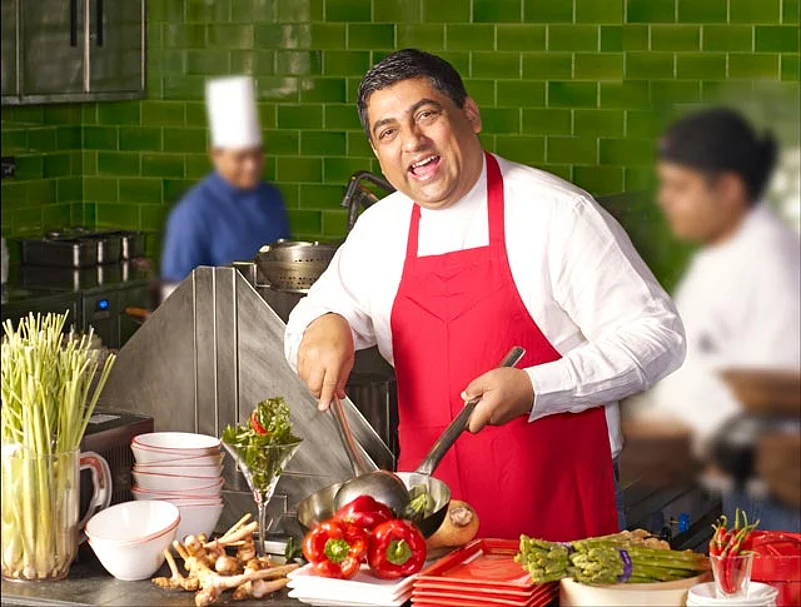If wars between India and China influenced choice of food and eating habits, then Chinese food should have vanished from the Indian map after the bloody 1962 battle where more than 4,000 Indian soldiers reportedly lost their lives.
In the wake of the Galwan valley standoff on June 15 this year, where 20 soldiers were killed by People's Liberation Army, the outcry to boycott Chinese goods in India may have hit fever pitch in certain sections of the media, but ground realities tell a different story.
At least, the Chinese food industry has been largely untouched and the only worry has been the coronavirus and the lockdown that have prohibited dine-in facilities at your favourite restaurants and malls.
Yet, as Mainland China Managing Director Anjan Chatterjee tells Outlook in this exclusive interview, the common man's love for good Chinese food remains as strong as ever and even though volume of business has been majorly impacted, the appetite for bland Cantonese or sweet-and-sour Hunanese or the fiery Schezwan has not diminished a bit.
Excerpts from a chat:
Outlook: How has the 'Boycott China' mood impacted the food industry?
Chatterjee: I don’t think the 'Boycott China' call has impacted the food and hospitality industry at all. What has impacted is the lockdown due to the pandemic and we are looking at an uncertain future. Our main brand – Mainland China – was shut for more than four months and we have opened shop in Kolkata and Bangalore for about fice-six weeks now. With dine-in restricted to 50 per cent, the footfalls are low and business is fluctuating but the deliveries are keeping the needle moving. In fact, we have seen a 40 per cent rise in takeaways. That’s quite incredible.
Q: That means your customers haven’t lost their appetite for quality Chinese food?
A: Why should they? There is a concept called ‘revenge eating’ or ‘revenge shopping’. Everybody thought that they will come out after the lockdown but so many people are still dying and Bangalore, Chennai and Kolkata have again gone back to lockdown mode. So we have to close on weekends too and there is no bar service. And when you get the Bachchans of the world getting the coronavirus and COVID is back in the headlines, the entire atmosphere is scary. And I don’t need to tell you that the entire economy is in bad shape. Job losses and salary cuts have added to a complex conundrum.
Q: When you have the word ‘China’ attached to your brand, does it worry you?
A: Not at all. We deal with a profile of customers who are very understanding. If you love Chinese food, you won’t give it up because there is hostility with a country. People can talk rubbish but we have not had a single negative remark personally or in social media and don’t expect anything untoward in future. There is a huge brand love for Mainland China. It’s not about China, it's about India...everything here is Indian...from the company to the chef to the ingredients, everything here is Indian.
And if there is a problem (with noodles), then Maggi should close down tomorrow. You can’t be fooling people and suddenly tell them what to eat. Politics and food can never go together. Also, it is not China's birthright to sell Chinese food. It is the most popular foreign cuisine across the world. So many types of food – Italian, Mexican, Lebanese, and Greek – have come but Chinese is the most lovable.

Mainland China is following ISO 22000 standards to ensure complete safety of food from preparation to delivery
Q: We read reports that Mainland China is changing to Mainland Asia.
A: That absolutely rubbish. Mainland China is our flagship brand and it’s not going anywhere. I got calls from my customers in Bangalore if I was shutting down Mainland China. Some of my customers are bureaucrats and have a long association with us. I had to tell them that nothing is going to change. The media has been reporting in many ways and they are not entirely correct.
Q: So from where did this Mainland Asia concept come from?
A: It all started from a poster in Kolkata. Someone fired a message saying that the brand was changing its name. Going with the times, it made good gossip. But it is far from the truth. We have another brand called the Asia Kitchen. We have a dozen outlets in India and even in Dubai. There is a plan to open in Houston. We have been thinking of doing an equity migration. It means Mainland China will have a sister called Mainland Asia. It is a simple nomenclature change for a brand that will be selling food that is pan-Asian. There is a huge demand for South-east Asian food like nasi goreng (Malaysian/Indonesian), sushi (Japanese), khaw suey (Burmese) and Thai green curry. So Mainland Asia has a different positioning. Bringing flavours from around the Orient is our speciality.
Q: Intolerance seems to be the order of the day. How safe is Mainland China?
A: Very safe. If you are hinting towards racism and brands associated with colour of your skin, then food is not an appropriate comparison. Racism has been there for long and the Black Lives Matter only added fuel to the fire. In this case, brands are compelled to change because there is global uproar from the intellectual and social circles. So there is a compulsion. With food, there is no such pressure.
Q: What’s the future looking like in terms of business?
A: Very uncertain and extremely challenging. The mall owners are demanding rent and maintenance charges. We were out of business for months and the lockdown is something the government instituted. We are in court now but our customers must be kept happy. I mentioned about brand love. We have to protect it by all means and we are following ISO 22,000 standards. We have the best hygiene in place and for a standalone restaurant; it’s quite a big thing. Safety has been a massive differentiator and food is all about joy and happiness. We can’t afford to get it wrong.




















.jpg?w=200&auto=format%2Ccompress&fit=max)

1.jpg?w=200&auto=format%2Ccompress&fit=max)



